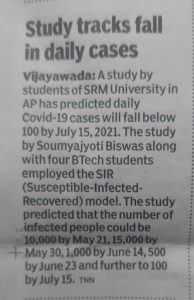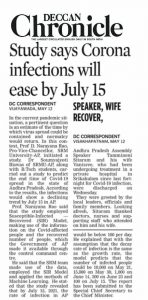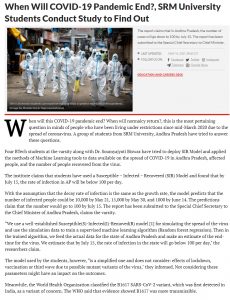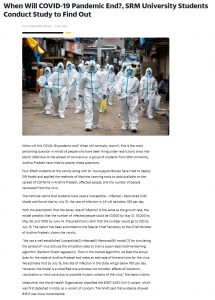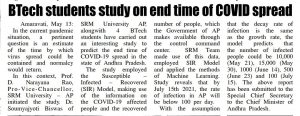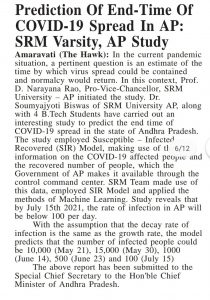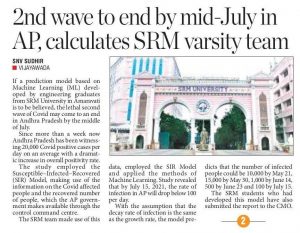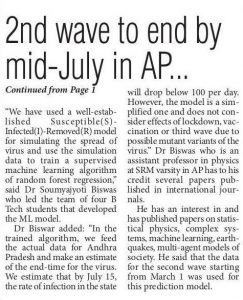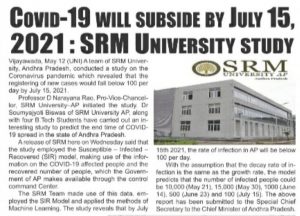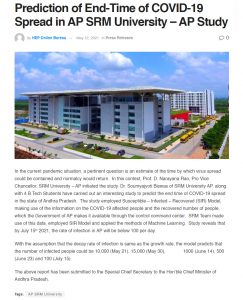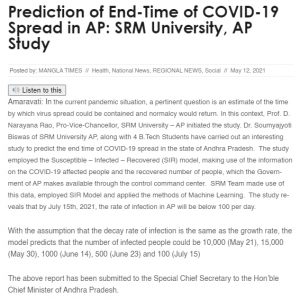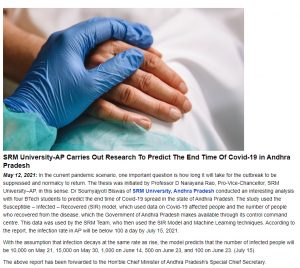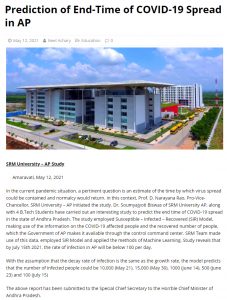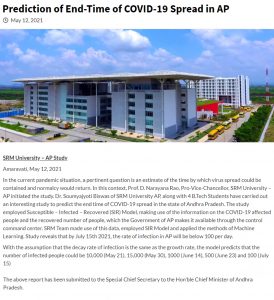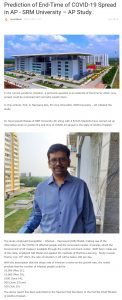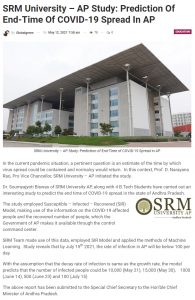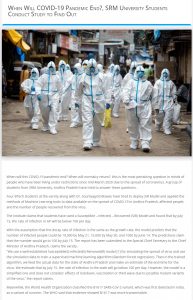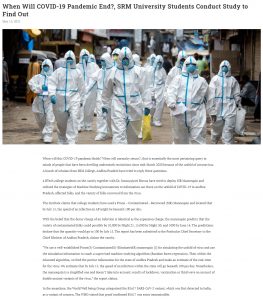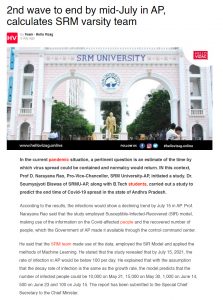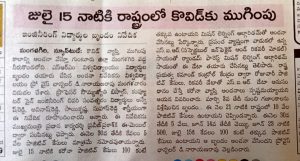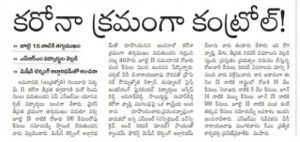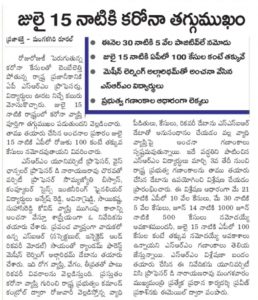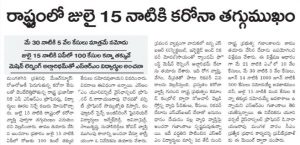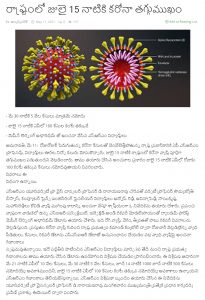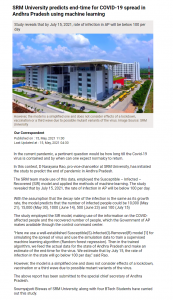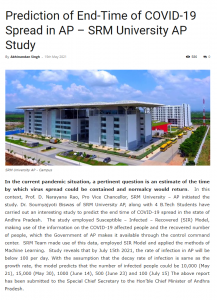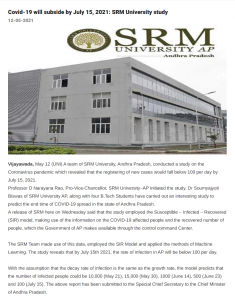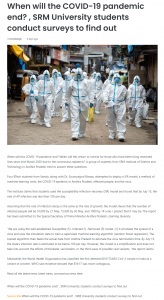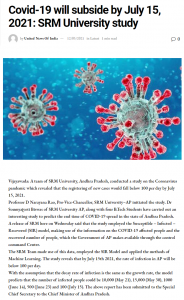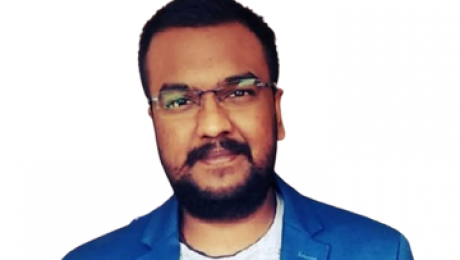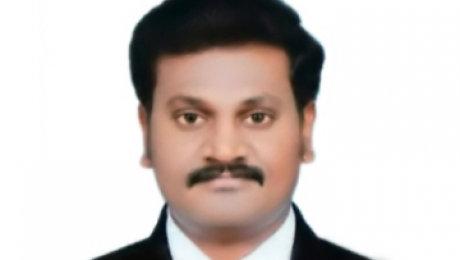Technology Business Incubator(TBI) of SRM university-AP launches first startup venture cohort
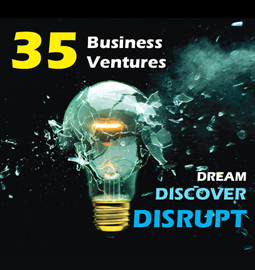 Technology Business Incubator(TBI) of SRM university-AP, Andhra Pradesh, is launching the first startup venture cohort with 35 selected startup ventures on May 15, 2021.
Technology Business Incubator(TBI) of SRM university-AP, Andhra Pradesh, is launching the first startup venture cohort with 35 selected startup ventures on May 15, 2021.
A very special guest of honour, Prof Ramesh Loganathan, Head of Co-innovation and Outreach at IIIT Hyderabad and Ex-Chief Innovation Officer of Telangana State Innovation Cell (TSIC), will interact with the teams and share his valuable industry experience and explain the scope of innovation and entrepreneurship as a career in India.
62 teams which comprise of 192 students applied for the opportunity. After a rigorous screening and evaluation on various parameters like innovation, scalability and commercialization, only 35 teams/ventures were selected to be a part of the SRM TBI’s first cohort.
The selected ventures will be mentored and supported for a period of minimum 12 months where they will be facilitated with infrastructure support, mentoring and networking support, seed fund and innovation fund support, hardware and software support, industry connectivity, learning resources, market exposure and several others.
The event will start with the welcome address of Prof V S Rao, Vice-Chancellor, SRM University-AP, followed by talk sessions of Dr Prakash Yadav, Head Innovation, Design and Entrepreneurship Academy (IDEA) and Vice President SRM TBI and Mr Udayan Bakshi, CEO SRM TBI and Associate Director-Entrepreneurship.
- Published in Events, IDEA Events
Prediction of End-Time of COVID-19 Spread in AP
- Published in Newsroom
A pertinent discussion on “Higher Education in India in the Post-COVID-19” with Prof Anil Sahasrabudhe
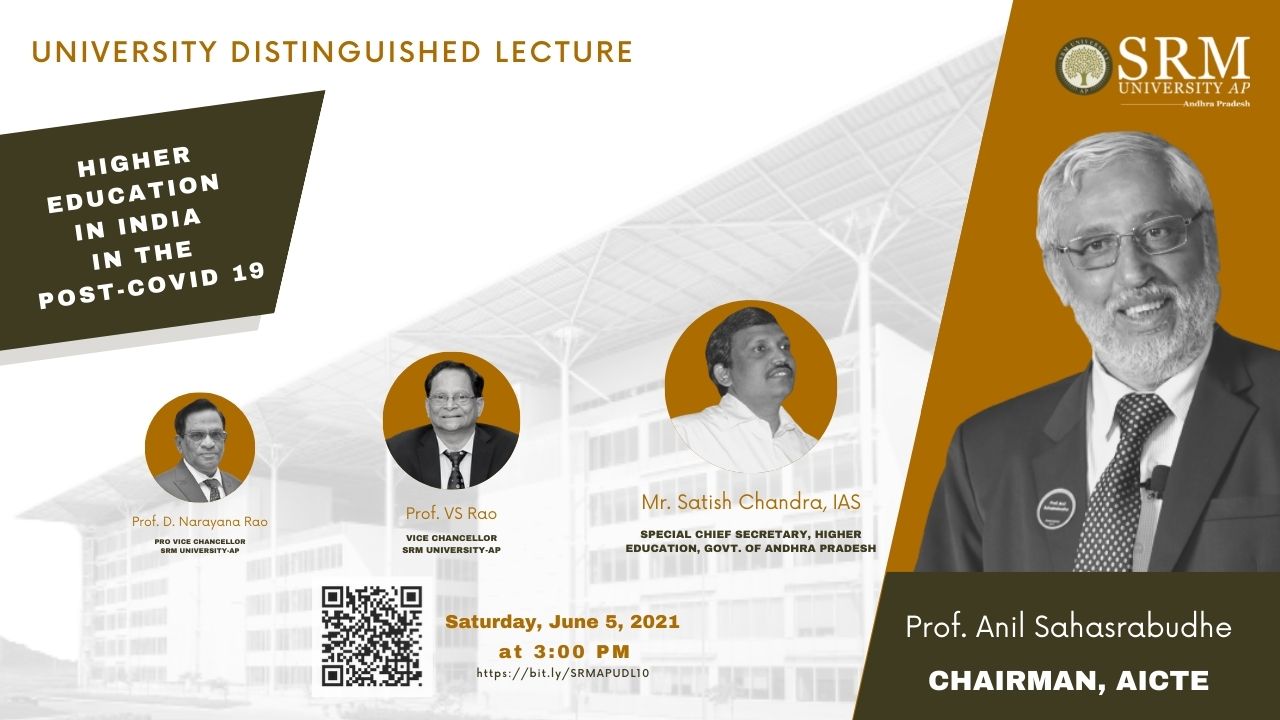 SRM University-AP presents the tenth edition of the University Distinguished Lecture Series with a relevant discussion on “Higher Education in India in the Post-COVID-19”. The webinar has been scheduled for Saturday, June 05, 2021, at 3 pm. Prof Anil Sahasrabudhe, Chairman of All India Council for Technical Education (AICTE), will join the webinar as the chief guest. Shri Satish Chandra, IAS, Special Chief Secretary, Higher Education, Government of Andhra Pradesh will give a special address.
SRM University-AP presents the tenth edition of the University Distinguished Lecture Series with a relevant discussion on “Higher Education in India in the Post-COVID-19”. The webinar has been scheduled for Saturday, June 05, 2021, at 3 pm. Prof Anil Sahasrabudhe, Chairman of All India Council for Technical Education (AICTE), will join the webinar as the chief guest. Shri Satish Chandra, IAS, Special Chief Secretary, Higher Education, Government of Andhra Pradesh will give a special address.
Prof Anil Dattatraya Sahasrabudhe is currently Chairman of the All India Council for Technical Education (AICTE). He was previously a Professor of Mechanical Engineering at Indian Institute of Technology (IIT)-Guwahati for 11 years.
Prof Anil D Sahasrabudhe has held several important Academic, Research and Administrative positions at the Indian Institute of Science, Bangalore, Tata Consulting Engineers, North Eastern Regional Institute of Science and Technology (NERIST), Itanagar (Arunachal Pradesh) and IIT Guwahati. He also served as Director, College of Engineering, Pune (CoEP) since 2006 on deputation from IIT, Guwahati, prior to joining as AICTE Chairman.
He is also the Chairman, Basic Scientific Research (BSR), Empowered Committee of UGC & SWAYAM Board. He is a Fellow of ISTE, IET, Institution of Engineers (IE), INAE.
As an academician and researcher in NERIST and IIT Guwahati, and an administrator at CoEP, he took up several initiatives for Academic, Curricular & Co-curricular activities, Entrepreneurship, Research and Good Governance.
Prof Anil Sahasrabudhe has been bestowed with several awards, which include “Maha-Intrapreneur Award-2011” of Praj Industries, Jeevan Gaurav Puraskar (Life Time Achievement Award) from MIT World Peace University, Pune in 2019, Mahatma Gandhi Leadership award from Indian Achievers Forum and CSR Times (2019).
Join the captivating webinar on June 5, 2021, at 3 pm to be a part of an exciting discussion on the Changing scenario of Higher Education in the Post-COVID era.
Register: http://bit.ly/SRMAPUDL10 (Registration Closed)
Programme Schedule: Know the detailed schedule here
- Published in Events, Research Events, University Distinguished Lecture, Webinars
“Dissolving Mood and anxiety”- A conversation towards mental happiness.
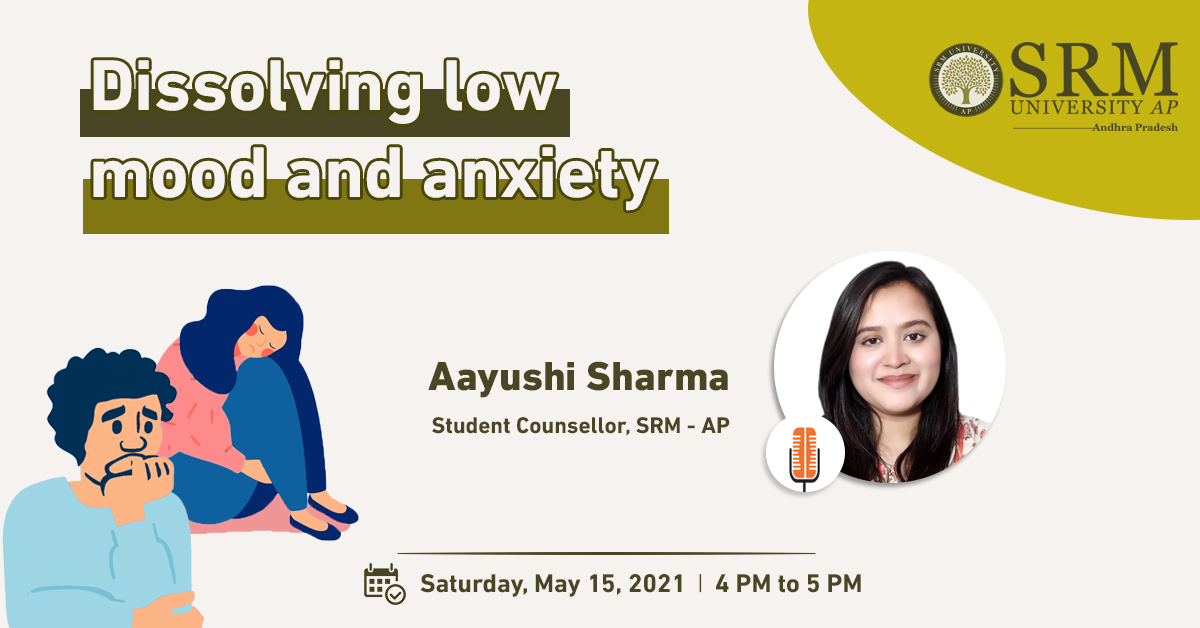 Are you feeling caged without being able to go out and meet your friends? Are you spending most of your day sitting in a corner? Are you being irritated with small trifle things? COVID-19 pandemic has put us into a trying time by all means. The month-long lockdowns, constant anxiety for your loved ones, indoor life without much activities are taking a toll on our minds.
Are you feeling caged without being able to go out and meet your friends? Are you spending most of your day sitting in a corner? Are you being irritated with small trifle things? COVID-19 pandemic has put us into a trying time by all means. The month-long lockdowns, constant anxiety for your loved ones, indoor life without much activities are taking a toll on our minds.
It is okay to feel low sometimes. It is okay to be depressed. We all are trying our best to cope with this unprecedented crisis. Understand that you are not alone in this. Most of all, you have someone to share your feelings and anxieties with.
The Department of Student Affairs initiated the weekly event with your counsellor to keep your mental health in check. This week Ms Aayushi Sharma, Student Counsellor, will enlighten you on “Dissolving Mood and anxiety” on May 15, 2021, at 4 o’clock in the afternoon.
Millions of people worldwide witness anxiety and low mood; out of the total population suffering, only 39-40% of them seek proper counselling. According to psychotherapists, the common symptoms are panic, fear, irrational worries, nervousness, and uneasiness. To know detailed information on the topic, join the session with your friends and family to help yourself and others when necessary.
- Published in Events, Students Affairs Events
SRMAP-TBI launches the first cohort of 36 start-up ventures
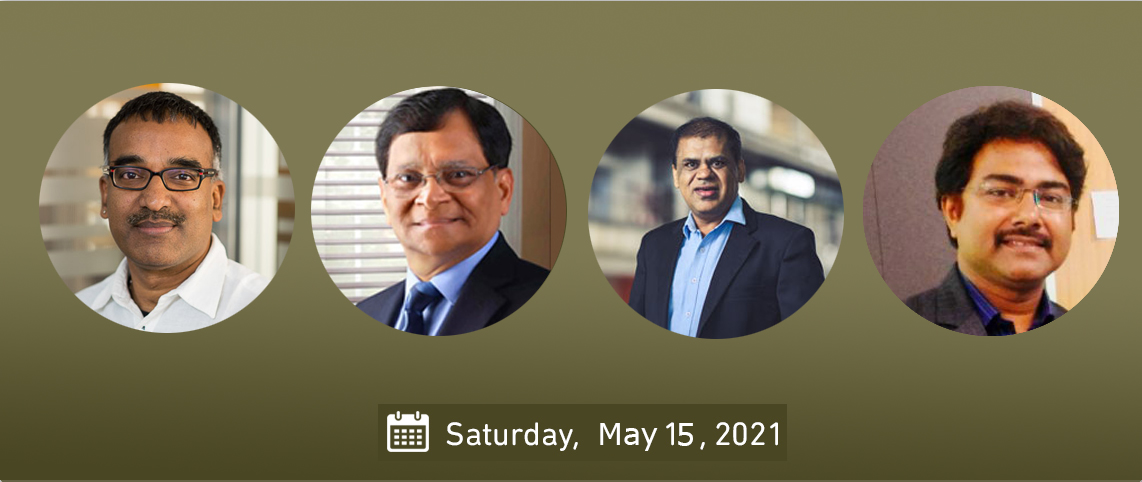
Technology Business Incubator of SRM University-AP launched the first venture cohort with 36 selected startup business ventures, on May 15, 2021, in the presence of the special guest of honour from industry, Prof Ramesh Loganathan, Head of co-innovation and outreach at IIIT Hyderabad and Ex-Chief Innovation Officer of the Telangana State Innovation Cell (TSIC).
“From the initial years onwards, SRM University-AP is focused to make entrepreneurs who can be the leaders of tomorrow. The University signed an MOU with the University of California, Berkeley to design the curriculum to promote entrepreneurship,” Said Prof V S Rao, Vice-Chancellor, SRM University-AP, in his welcome speech.
Advancing the proceedings of the event, the guest of honour Prof Ramesh Loganathan gave a brief understanding of the scope and future of entrepreneurship in India and the global scenario. “The entrepreneurial journey should start with identifying the problems in the ecosystem. A great example can be the face recognition software that started with the idea of capturing student attendance in colleges. Similarly, the budding entrepreneurs should identify such similar problems, do thorough market research and then prepare the business plan. The price of the product/idea should matter the last.”
SRM University-AP, Andhra Pradesh established the ‘Innovation, Design and Entrepreneurship Academy (IDEA)’ as part of the strategic alliance with UC Berkeley to create an academy combining their Sutardja Center for Entrepreneurship and Jacob Center of Design and Innovation to foster the culture of innovation, design and entrepreneurship among the students of all streams including engineering, liberal arts and sciences, and management. Dr Prakash Jadav, Associate Professor and Head of IDEA opined, “It is exciting to see so many students submitting their business ideas in the first business cohort. I am sure that with our guidance and mentorship, they all can reach new heights in setting up their ventures in the industry.”
62 teams, which comprises 192 students applied for the opportunity. After a rigorous screening and evaluation on various parameters like innovation, scalability and commercialization, only 36 teams/ ventures were selected to be a part of the SRM TBI’s first cohort.
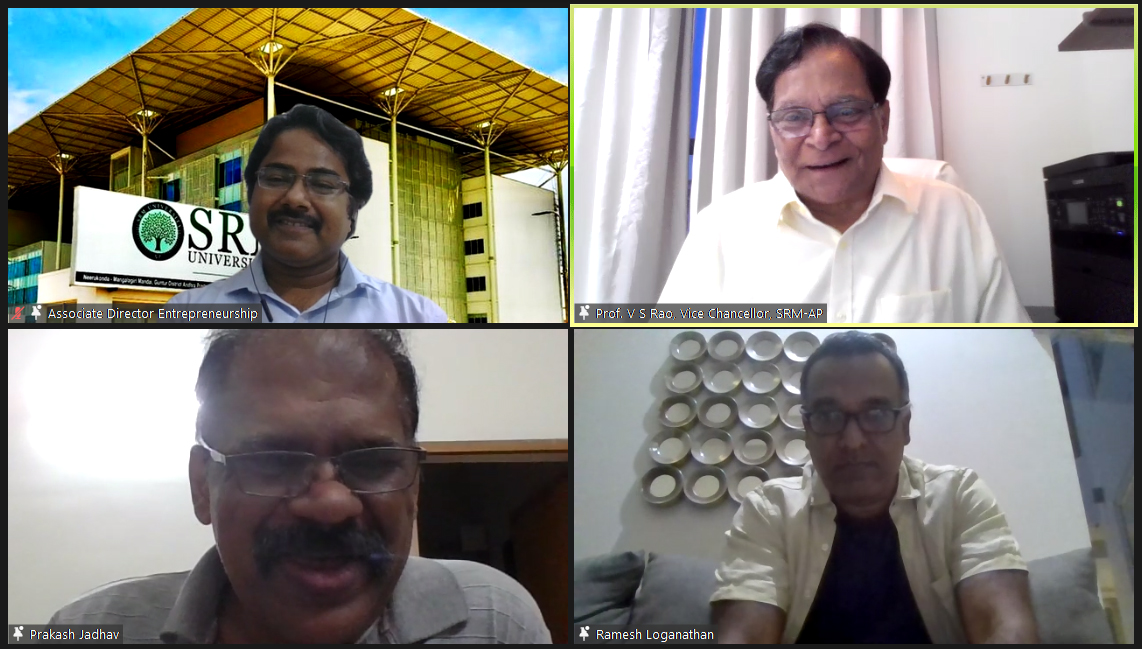 The selected ventures will be mentored and supported for a period of a minimum 12 months where they will be facilitated with infrastructure support, mentoring and networking support, seed fund and innovation fund support, hardware and software support, industry connectivity, learning resources, market exposure and several others.
The selected ventures will be mentored and supported for a period of a minimum 12 months where they will be facilitated with infrastructure support, mentoring and networking support, seed fund and innovation fund support, hardware and software support, industry connectivity, learning resources, market exposure and several others.
The selected ventures will be mentored and supported for a period of minimum 12 months will all the services of a regular technology business incubator. SRM TBI will also provide an opportunity to pitch to the investors, connects with industry experts, market linkage and a global network of mentors. The startups developing prototype and MVP can apply for the Product validation track and pre-revenue/ revenue stage startups can apply for the Market validation track. Each of the 36 startup ventures will get hands-on mentoring and guidance from the mentors and experts from their respective working areas. The startups go through physical interactions through contact sessions at SRM AP and virtual interaction with mentors through online workshops during the program.
After the Q & A session Mr Udayan Bakshi, CEO SRM TBI & Associate Director Entrepreneurship, cordially thanked all the speakers and panellists for their efforts to make the SRM TBI cohort launch a grand success. He also highlighted that TBI will not limit to just this batch of students or to the SRM University-AP, but shall extend its vision and activities to the entire ecosystem
Prediction of End-Time of COVID-19 Spread in AP
In the current pandemic situation, a pertinent question is an estimate of the time by which virus spread could be contained and normalcy would return. In this context,Prof.Narayana Rao, Pro Vice Chancellor, SRM University – AP initiated the study. Dr. Soumyajyoti Biswas of SRM University AP, along with 4 B.Tech Students have carried out an interesting study to predict the end time of COVID-19 spread in the state of Andhra Pradesh. The study employed Susceptible – Infected – Recovered (SIR) Model, making use of the information on the COVID-19 affected people and the recovered number of people, which the Government of AP makes it available through the control command center. SRM Team made use of this data, employed SIR Model and applied the methods of Machine Learning. Study reveals that by July 15th 2021, the rate of infection in AP will be below 100 per day.
With the assumption that the decay rate of infection is same as the growth rate, the model predicts that the number of infected people could be 10,000 (May 21), 15,000 (May 30), 1000 (June 14), 500 (June 23) and 100 (July 15)
The above report has been submitted to the Special Chief Secretary to the Hon’ble Chief Minister of Andhra Pradesh.
Media Panorama
- Published in News, Physics News, Research News
“Films as History; Exploring Historiophoty”-a discussion on defining the relations between Films and History.
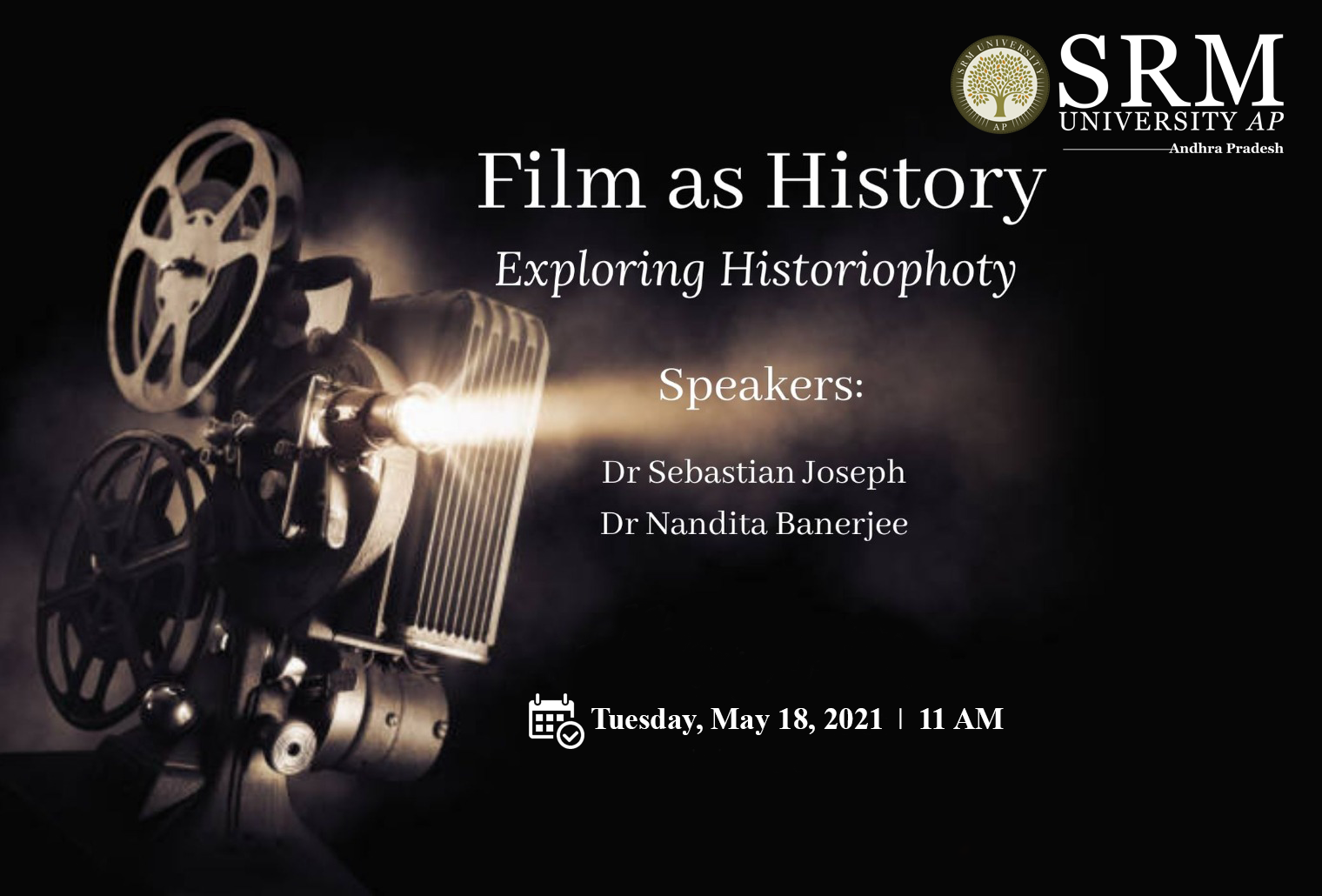 The Department of History, SRM University-AP, initiates a monthly webinar series with a thought-provoking discussion on defining the relations between Films and History. “Films as History; Exploring Historiophoty”, the introductory session of the series, has been scheduled for Tuesday, May 18, 2021, at 11 am.
The Department of History, SRM University-AP, initiates a monthly webinar series with a thought-provoking discussion on defining the relations between Films and History. “Films as History; Exploring Historiophoty”, the introductory session of the series, has been scheduled for Tuesday, May 18, 2021, at 11 am.
Dr Sebastian Joseph, a Historian and Film Critic, will deliver the first talk of the webinar. Dr Joseph was the State Award Winner for Best work on Film History 2020. He has authored Cochin Forests and the British Techno-ecological Imperialism in India.
Dr Nandita Banerjee will be the keynote speaker in the second session of the webinar. She is an Associate Professor at Sindhu Kanho Birsa University and a pioneer in Film History and Visual Studies in History.
The webinar aims to discuss the use of films in particular and visual images in general as sources for the reconstruction of History. It will deal with the promises and challenges of Historiophoty as a sub-stream of history. Following Hayden White’s pathbreaking analysis of visual imagery and its location in historiography, Historiophoty has emerged as a most promising pathway for historians, particularly as we move towards a rapidly digitizing world. The webinar series will introduce students to new and exploratory themes in History.
Join the Webinar Here: https://srmap.zoom.us/j/96304703524?pwd=VVRBY3VLRDdsbEVGTDBBdnY0T2RrQT09
Meeting ID: 963 0470 3524
Passcode: 803909
- Published in Events, History Current Happenings, History Events, Webinars
IIRS-ISRO offers “Online Certificate Course on Space Technology and Applications”
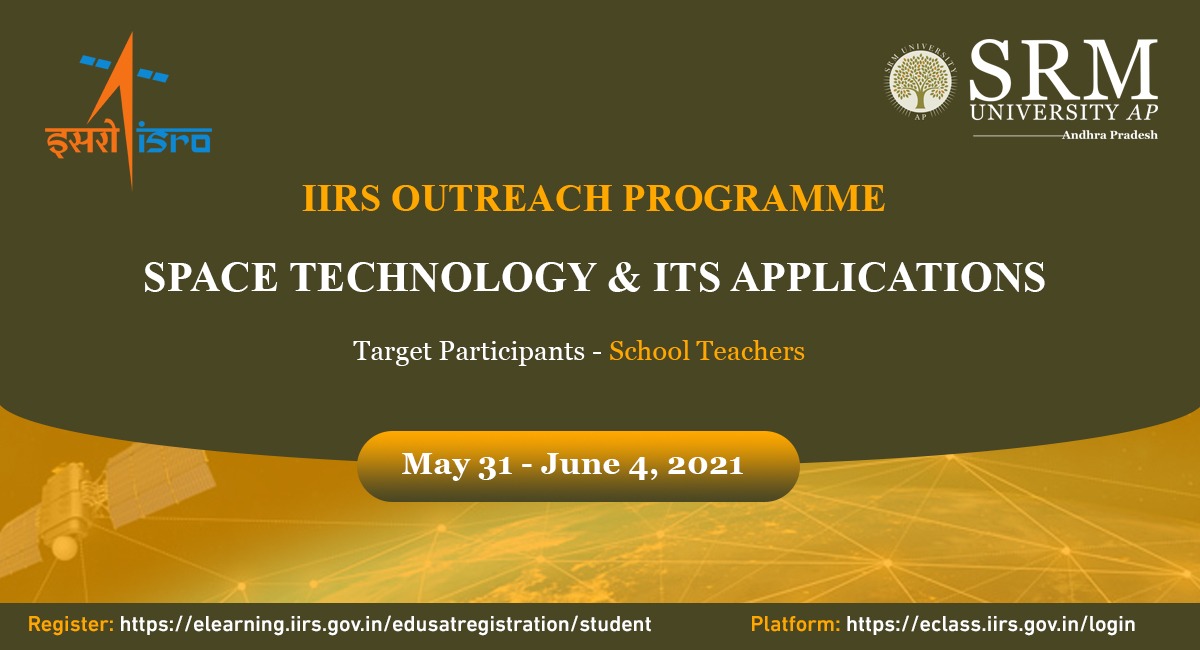 Indian Institute of Remote Sensing (IIRS) -Indian Space Research Organization(ISRO) is offering a five-day “Online Certificate Course on Space Technology and Applications” from May 31 to June 04, 2021. The course will be highly beneficial for the school teachers, who teach science, mathematics and geography. The Registration process is going on for the course. With a limited number of available seats, participants are encouraged to secure their enrolment as early as possible. The course intends to create awareness and capacity building of school teachers on the use of space technology and its application.
Indian Institute of Remote Sensing (IIRS) -Indian Space Research Organization(ISRO) is offering a five-day “Online Certificate Course on Space Technology and Applications” from May 31 to June 04, 2021. The course will be highly beneficial for the school teachers, who teach science, mathematics and geography. The Registration process is going on for the course. With a limited number of available seats, participants are encouraged to secure their enrolment as early as possible. The course intends to create awareness and capacity building of school teachers on the use of space technology and its application.
IIRS outreach programme is an innovative distance learning initiative for training the students and professionals from academic Institutions and user departments in the field of geospatial technology & Earth Observation (EO) by utilising state-of-art Information and communication technologies. SRM University AP-Andhra Pradesh has collaborated with the Indian Institute of Remote Sensing (IIRS) -Indian Space Research Organization (ISRO) ‘s outreach programmes. As part of the association, SRM University-AP being the nodal centre for such programmes, the people of SRM University-AP have the excellent opportunity to register for courses as well as live and interactive programmes being organised by IIRS. In addition, E-learning courses for a short span of 3-4 Month duration will be accessible by the students.
Course Brochure: Know more about the course
Course Schedule: View the detailed course schedule
Registration Link: https://elearning.iirs.gov.in/edusatregistration/student
Platform where course is held: https://eclass.iirs.gov.in/login
- Published in ECE Events, Events


